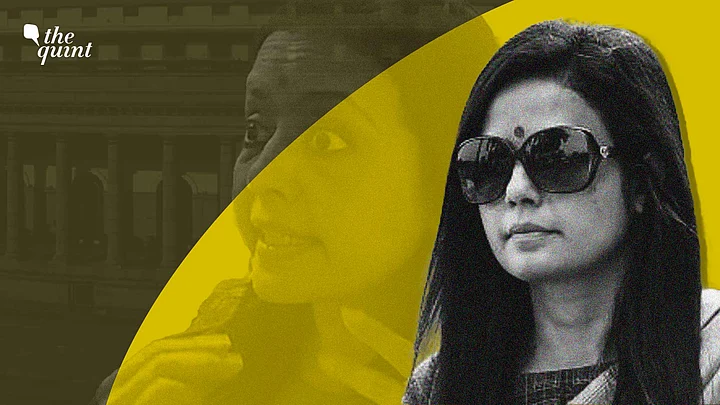The Narendra Modi-led government at the Centre applauds itself as a champion of women, working tirelessly to empower them and give them an equal space in society. Yet last week the ruling Bharatiya Janata Party (BJP) exposed itself as one that stoops to the crudest form of patriarchy, one that cannot resist the temptation of trying to bring down an outspoken woman by the age-old strategy of painting her as "immoral”.
On 2 November, Mahua Moitra, the Trinamool Congress MP stormed out of the parliamentary ethics committee meeting which was to probe certain charges against her, saying that the committee chairman, Vinod Kumar Sonkar, had subjected her to “filthy”, “sordid”, “cheap” and “unethical” questions. She called it a veritable "vastraharan”, a shocking attempt to strip her of her dignity. And she was not far wrong.
Five Opposition members of the committee also walked out of the meeting, saying that they could not be party to the offensive personal questions that were being posed to her.
A Public Humiliation
Moitra has, of course, been in a spot since last month when her ex-boyfriend, Jay Anant Dehadrai, with whom she is engaged in a bitter custody battle over a pet, alleged that she was involved in a cash-for-query arrangement with the industrialist Darshan Hiranandani. The inference was that Moitra’s questions in Parliament relating to controversial business mogul Gautam Adani were made at the behest of Hiranandani, who is supposed to be Adani’s competitor.
Soon after, Hiranandani too went on record to say that Moitra had accepted gifts and favours from him.
It was said, moreover, that she had shared with Hiranandani her login and password for posting questions on the Parliament’s website. This was sought to be portrayed as an act of grave misdemeanour, although as Moitra has pointed out, and rightly, that MPs routinely share their login and password with their staff, and, in the absence of any specific rule on this matter, they can, in fact, share it with anyone.
Predictably, the charges — whether trumped up or not — were pure manna for the BJP. Moitra has not endeared herself to the ruling party by ferociously questioning the alleged murkiness and malpractices in Adani’s gargantuan business empire, and repeatedly calling out the Prime Minister’s supposed proximity to him.
Hence, it was to be expected that her political opponents would try to leverage the charges against her and go after her with all guns blazing. What one did not expect, however, was that the exercise would be turned into a kind of public stoning, with the sole object of humiliating her and depicting her as a woman of easy virtue.
The Ethics Committee Deviated From Doing Its Job
Moitra said that Sonkar asked such sleazy questions as ‘who do you talk to at night, for how long, how ‘dear’ a friend is so-and-so and does his wife know about it, which hotel did you go to, who were you with, and so on.’ (There is no reason to doubt the veracity of her claim as the committee’s proceedings were recorded verbatim).
Needless to say, the questions were utterly obnoxious, insulting, sexist, and violative of Moitra’s privacy. But they were also irrelevant and had nothing to do with what the committee was mandated to do, ie, probe the cash-for-query charge against the MP and determine if she had committed an unethical act by sharing her login and password with a friend whose office staff was giving her clerical support and typing in and uploading her questions on the Parliament website.
So why then did Sonkar embark on this voyeuristic line of questioning at the ethics committee hearing?
Could it be because, in the eyes of toxic patriarchy a woman is automatically proved culpable if she can be shown not to conform to its idea of feminine morality? Could it be because, in the absence of any firm proof to substantiate the allegations against Moitra, it was felt that character assassination and portraying her as some sort of a promiscuous Jezebel would torpedo the respect and admiration that she enjoys among lakhs of Indians for being a spirited and razor-sharp parliamentarian?
Parliamentary Probe Into ‘Cash for Query’ Case Is Steeped in Patriarchy
Let us not forget that the current campaign against Moitra was kicked off by circulating pictures of her at a party where she is seen drinking and smoking a cigar. The gambit was laughable in its crassness, in its callow belief that the pictures proved that she was a “certain type of woman” (Read: morally suspect) and hence could also have committed the unethical acts that she has been accused of.
There’s no doubt that Moitra gets the goat of many venerable politicians with her unabashed embrace of her lifestyle choices. She is too in-your-face, too tell-it-like-it-is, too unapologetic. Whether it is her Louis Vuitton handbag or her frank, matter-of-fact admission of a soured relationship with a former partner — unlike legions of furtive male politicians, she seems to prefer not to put her skeletons (if they could be called that) in the cupboard.
That Moitra is being hounded for her relentless attack on Adani and the Prime Minister is bad enough. What is worse is that the modus operandi of that hounding is so shoddy, so mired in regressive anti-women mindsets that it makes a parliamentary probe into an excuse to pry into her personal life in order to discredit her.
(Shuma Raha is a journalist and author. She tweets @ShumaRaha. This is an opinion piece and the views expressed are the author’s own. The Quint neither endorses nor is responsible for them.)
